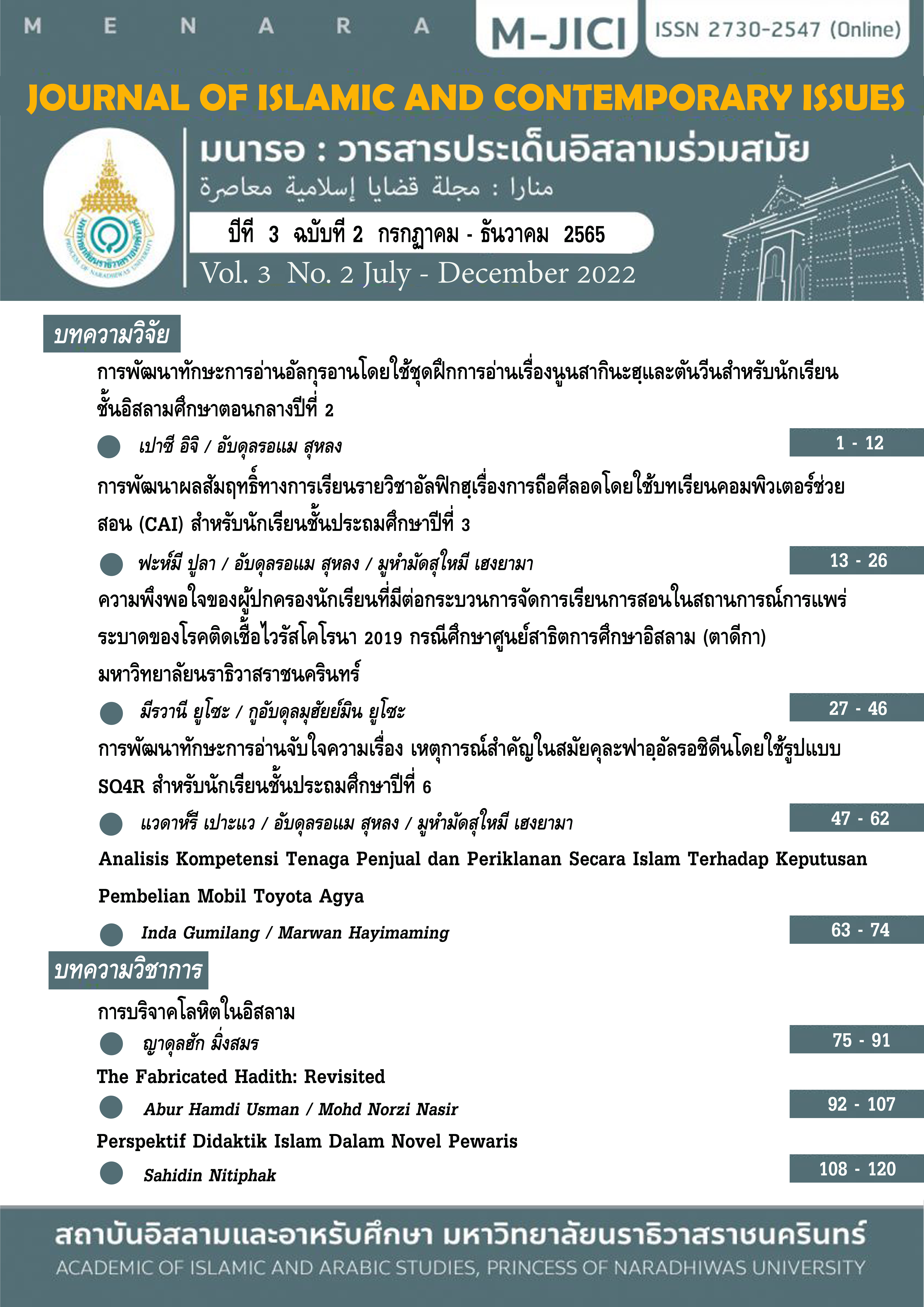Hadis Palsu: Suatu Tinjauan Semula
คำสำคัญ:
Hadis, Palsu, Masyarakat, Teks, Penularanบทคัดย่อ
Isu yang timbul apabila hadis melalui sabda Nabi Muhammad SAW sebagai pemimpin agama dipalsukan oleh segelintir pihak yang tidak bertanggungjawab melanda masyarakat Islam selepas kewafatan Baginda SAW. Ia adalah satu ancaman besar bagi masyarakat kerana ritual keagamaan mereka tidak benar di samping pemahaman agama yang telah rosak. Situasi ini menjadi lebih mencelarukan tanpa adanya penjelasan tentang status hadis-hadis tersebut apabila sesetengah individu dalam kedudukan yang tidak berdaya menerima secara mudah semua yang dianggap disabdakan oleh Nabi SAW. Dengan menggunakan kaedah kualitatif, kajian ini meninjau semula bahaya pemalsuan hadis. Artikel ini mendapati bahawa para ulama hadis sentiasa berusaha untuk menjelaskan pendirian mereka terhadap hadis-hadis palsu yang disebarkan secara meluas dan tular dalam kalangan umat Islam sebagai bukti cakna Allah AWT terhadap keutuhan agama Islam hingga akhir zaman. Secara khusus, keberadaaan hadis palsu menimbulkan masalah besar dalam kepercayaan agama apabila ia dikategorikan sebagai hadis yang akhirnya diterima dan dianggap benar.
เอกสารอ้างอิง
al-Asqalani, I.H. (1986). Lisan al-Mizan. Beirut, Lebanon: Mu’assasah al-A’lami.
al-‘Iraqi, A.M. (1961). al-Firaq al-Muftariqah bayna Ahl al-Zaygh wa al-Zanaddiqah. Ankara, Turkey: Nur Matbaasi.
Abdullah, I. & Abdul Manas, S. (2009). Introduction to the sciences of Hadith. Kuala Lumpur, Malaysia: IIUM Research Centre.
Adil, A. (2021). Signs Indicative of Fabrication in Narrations. Journal of Integrated Sciences, 1(3): 52–64.
Afsaruddin, A. (2009). An Insight into the Hadith Methodology of Jamal al-Din Ahmad b. Tawus. Der Islam, 72(1):
–46.
Akhtar, P. (2014). ‘We were Muslims but we didn’t know Islam’: Migration, Pakistani Muslim women and changing religious practices in the UK. Women’s Studies International Forum, 47(B): 232–238.
al-Albani, M.N. (1972). Silsilat al-Ahadith al-Daifah wa al-Maudu' a Atharuh al-Sayi' fi al-Ummah. Syria: Dar al-Kutub al-‘Ilmiyyah.
Amin, A. (1986). Fajr al-Islam. Egypt: Maktaba al-Nahda al-Misriyyah.
Binbeshr, F., Amirrudin, K., & Mohammed, M. (2021). A Systematic Review on Hadith Authentication and Classification Methods. ACM Transactions on Asian and Low-Resource Language Information Processing, 20(2): 1–17.
Boutz, J., Benninger, H., & Lancaster, A. (2018). Exploiting the Prophet’s Authority: How Islamic State Propaganda Uses Hadith Quotation to Assert Legitimacy. Studies in Conflict & Terrorism, 42(11): 972–996.
Brown, J. A. C. (2009). Hadith: Muhammad’s legacy in the medieval and modern world. Oxford, UK: Oneworld Publications.
al-Fadli, A. H. (2011). Introduction to Hadith. London, UK: Islamic College for Advanced Studies (ICAS).
Geissinger, A. (2011). ‘A’isha bint Abi Bakr and her Contributions to the Formation of the Islamic Tradition. Religion Compass, 5(1): 37–49.
al-Ghazali, A. H. (1993). Faysal al-Tafriqah bayna al-Islam a al-Zanadiqah. Beirut : Dar al-Bayruti.
Goldziher, I. (2012). Muhammedanische Studien. n.p.: Ulan Press.
Hashim, A. ‘U. (n.d.). Al-Sunna al-Nabawiyya wa 'Utumuha. Cairo : Maktaba Gharib.
Hill, L. (2011). The hidden theology of Adam Smith. European Journal of the History of Economic Thought, 8(1): 1–29.
Ibn al-Jawzi, A. F. (1966). Kitab al-Maudu'at (Vol. 1). Beirut : Dar al-Kutub al-‘Ilmiyyah.
al-Jawziyyah, I. Q. (1994). al-Manar al-Munif fi al-Sahih wa al-Da'if. Beirut : Maktab Al-Islamiyah.
Juynboll, G. H. A. (1969). The Authenticity of the tradition literature: Discussions in modern Egypt. Leiden, Holland: Brill.
Kamali, M. H. (2005). A textbook of hadith studies: Authenticity, compilation, classification, and criticism of Hadith. Great Britain: Islamic Foundation
al-Kandahlawi, M.Z. (2004). The Differences of the Imams. London, UK: White Thread Press.
Kazi, M. (1990). Guidance from the Messenger: A treasury of ahadith. Pakistan: Al Huda Publications.
Khalifa, R. (2001). Quran, Hadith, and Islam. California, CA: Universal Unity.
Koya, P. K. (Ed.). (1996). Hadith and sunnah: Ideals and realities. Kuala Lumpur : Islamic Book Trust.
Malek, M. A. (2000). A study of the Quran: The universal guidance for mankind. Sutton, United Kingdom: M. A. Malek.
Motzki, H. (2009). The Collection of the Qur’ān. A Reconsideration of Western Views in Light of Recent Methodological Developments. Der Islam, 78(1): 1–34.
Muhamed Ali, M. A., Ibrahim, M. N., Usman, A. H., Nazri, M. A., & Abdul Kadir, M. N. (2015). Al-Jarh Wa Al-Ta’dil (Criticism and Praise): It’s significant in the science of Hadith. Mediterranean Journal of Social Sciences, 6(2):
–292.
Pickthall, M. M. (1970). The meaning of the Glorious Quran: Text and explanatory translation. Karachi, Pakistan:
Taj Company.
al-Sabbagh, M. (1977). al-Hadith al-Nabawi Mustalahuhu Balaghatuhu Kutubuhu. Beirut : Al-Maktab al-Islami
al-Salih, S. (1996). 'Ulum al-Hadith wa Mustalahuhu. Beirut : Dar ‘Ilm li al-Malayin.
al-Siba'i, M. (2008). The sunnah and its role in Islamic legislation. International Islamic Publishing House
Shakir, M. (1983). al-Ba’ith al-Hadith Ikhtisar 'Ulum al-Hadith. Beirut : Dar al-Kitab.
Siddiqi, M. Z. (1961). Hadith literature: Its origin, development, and special features. India: Calcutta University Press.
Siddiqi, M. Z.. (1996). Hadith: A subject of keen interest. In P. K. Koya (Ed.), Hadith and Sunnah: Ideals and Realities. (pp. 3–22). Kuala Lumpur, Malaysia: Islamic Book Trust.
al-Suyuti, J. (1998). al-La'ali al-Msnu'ah fi al-Ahadith al-Maudu'ah. Beirut : Dar al-Kutub al-‘Ilmiyyah.
Taslaman, C. (2021). Can a Muslim be an Evolutionist. In K. J. Clark & J. Koperski (Eds.), Abrahamic Reflections on Randomness and Providence. (pp. 107–117). Palgrave Macmillan.
Usman, A. H. & Ibrahim, M. (2014). Shihab’s Thought of Hadith: A Critical Analysis. Global Journal Al Thaqafah, 4(1): 33–40.
Usman, A. H., Wazir, R., & Ismail, Z. (2017). The notion of liberalisation on the Anti-Hadith Movement and its impact on society. Al-Irsyad: Journal of Islamic and Contemporary Issues, 2(2): 81–94.
Usman, A. H., Yama, P., Mohd Amin, M. F., Ibrahim, K. M. & Muhammad Faiz Mukmin, A. M. (2018). Revisiting the Hazard of Fabricated Hadith. Advanced Science Letters, 24(4): 2458–2461.
Yahya, H. A. Q. (2014). Early Islamic methodology comparative study of Hadith literature through al-Bukhari. International Humanities Studies, 1(3): 49–63.
ดาวน์โหลด
เผยแพร่แล้ว
รูปแบบการอ้างอิง
ฉบับ
ประเภทบทความ
สัญญาอนุญาต
ลิขสิทธิ์ (c) 2022 มนารอ : วารสารประเด็นอิสลามร่วมสมัย

อนุญาตภายใต้เงื่อนไข Creative Commons Attribution-NonCommercial-NoDerivatives 4.0 International License.



